

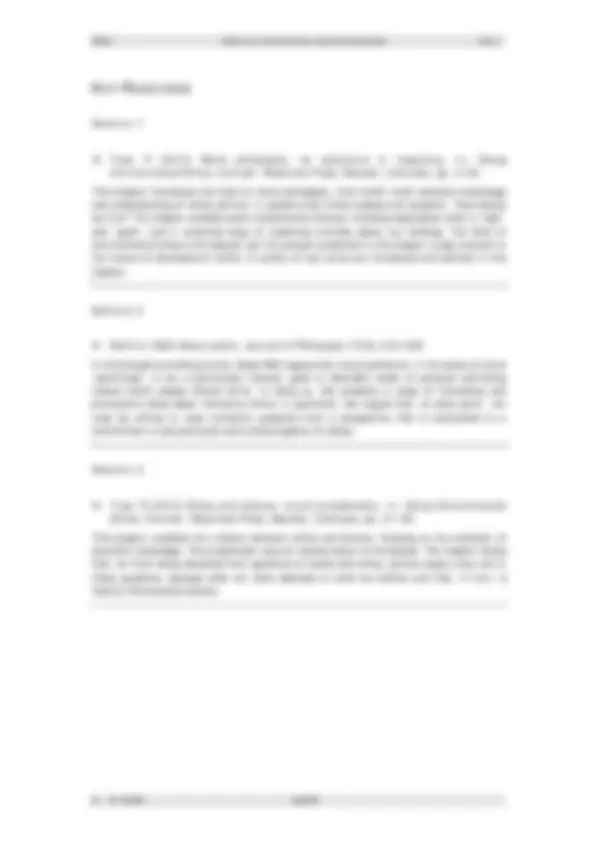

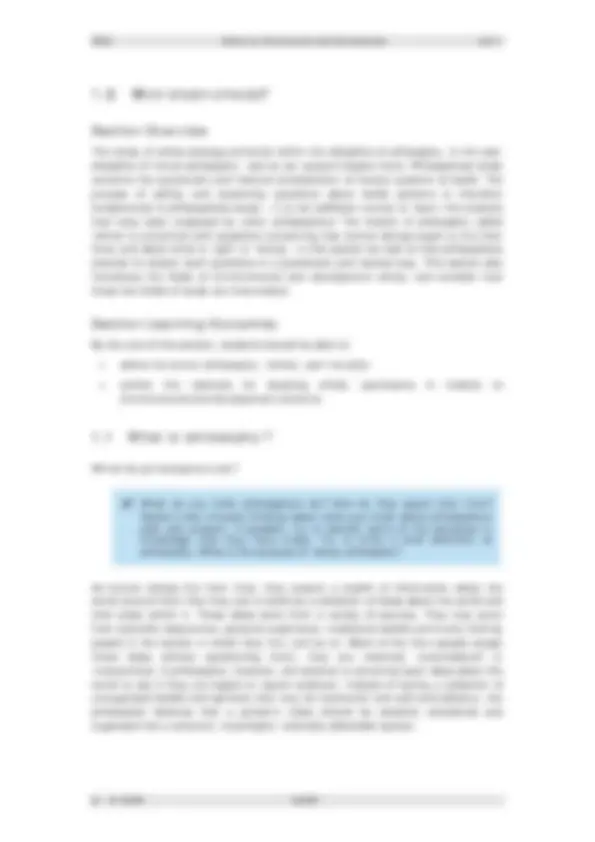

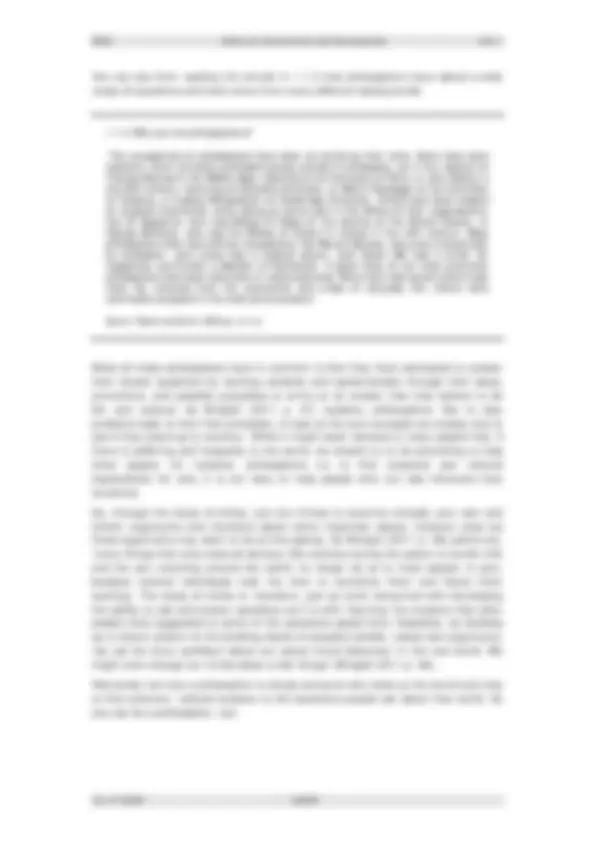






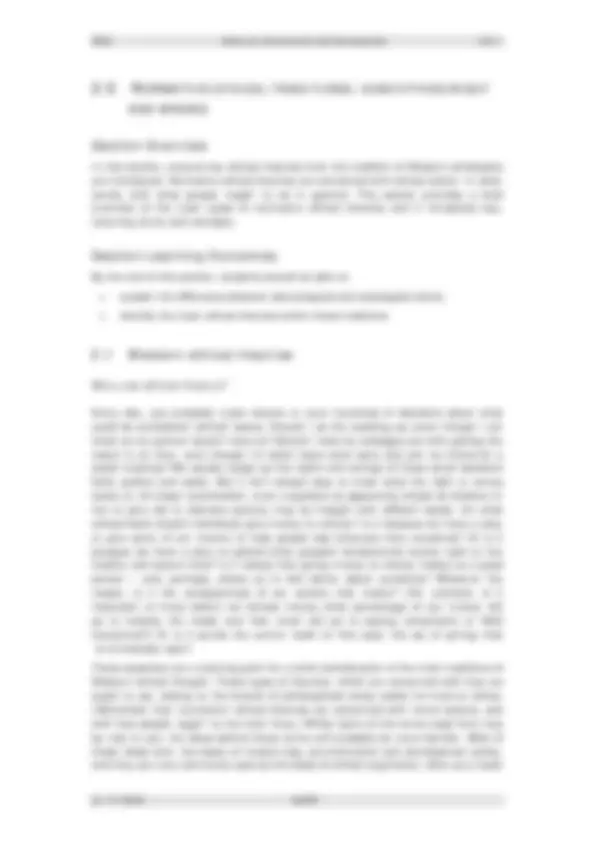
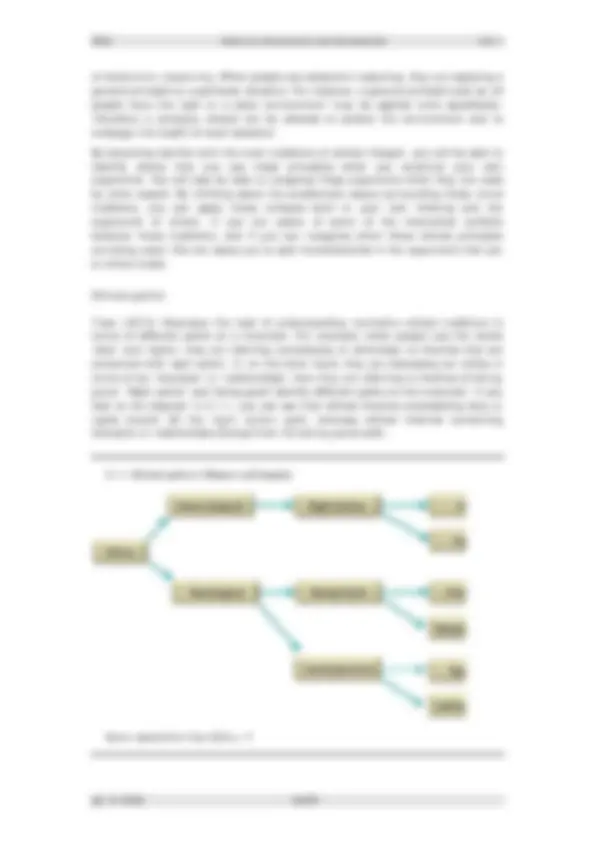
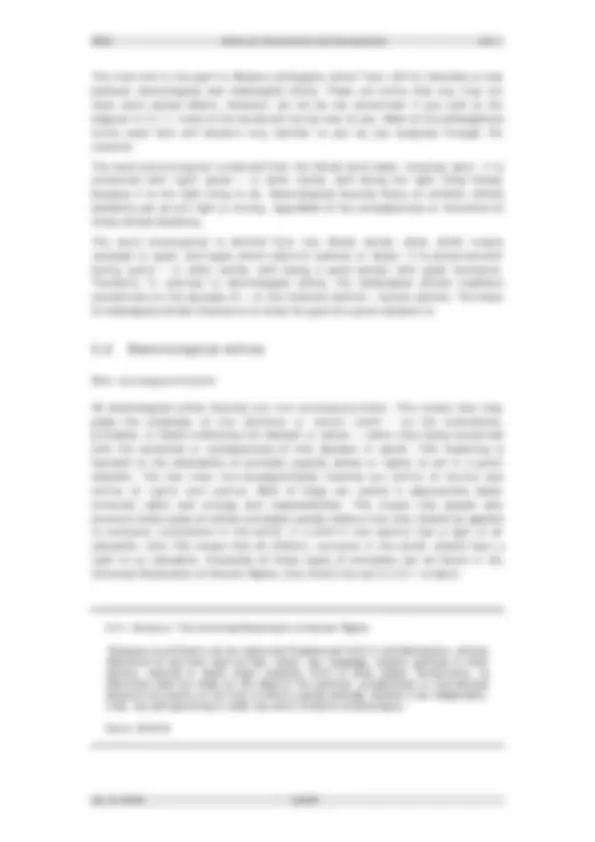





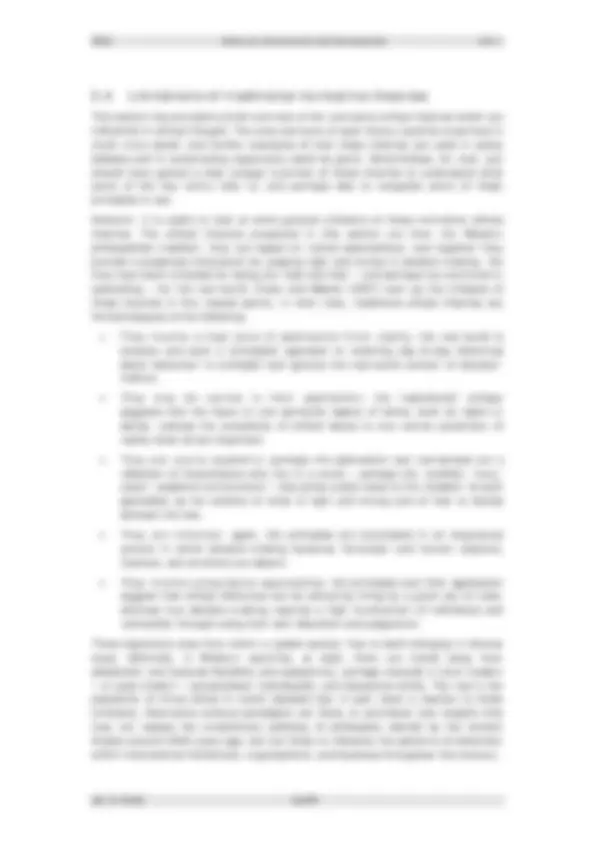

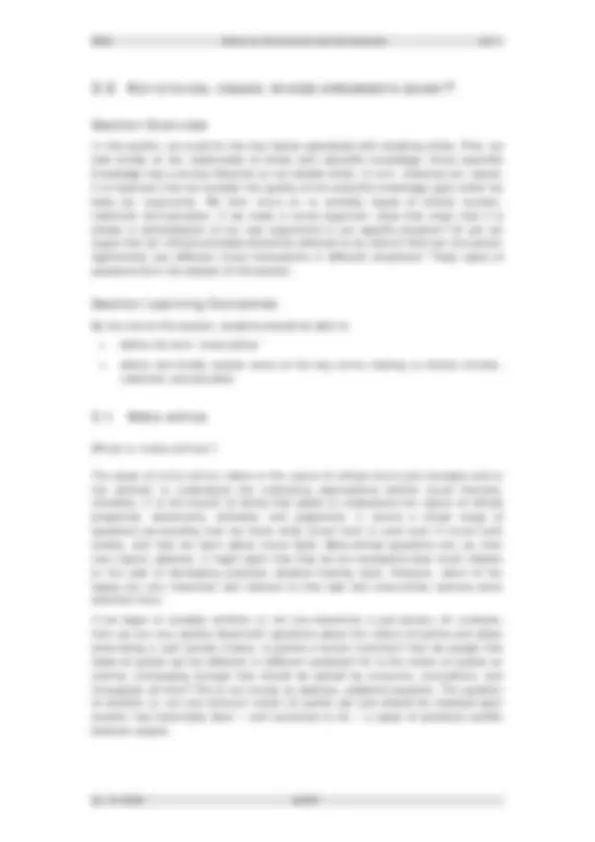
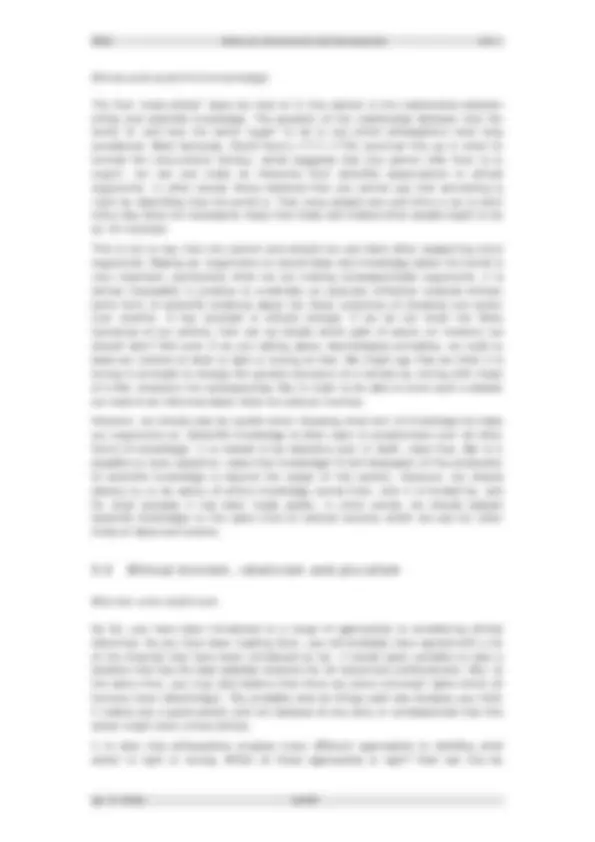



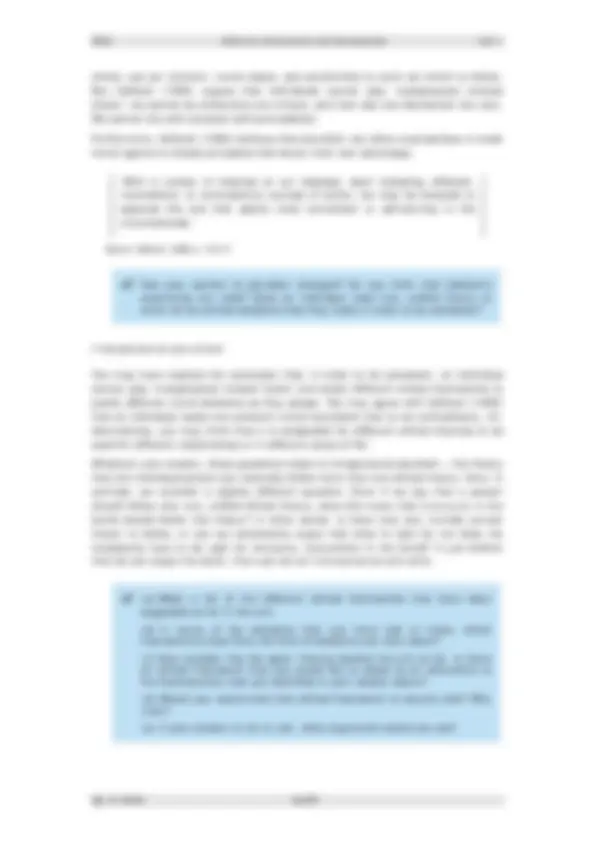




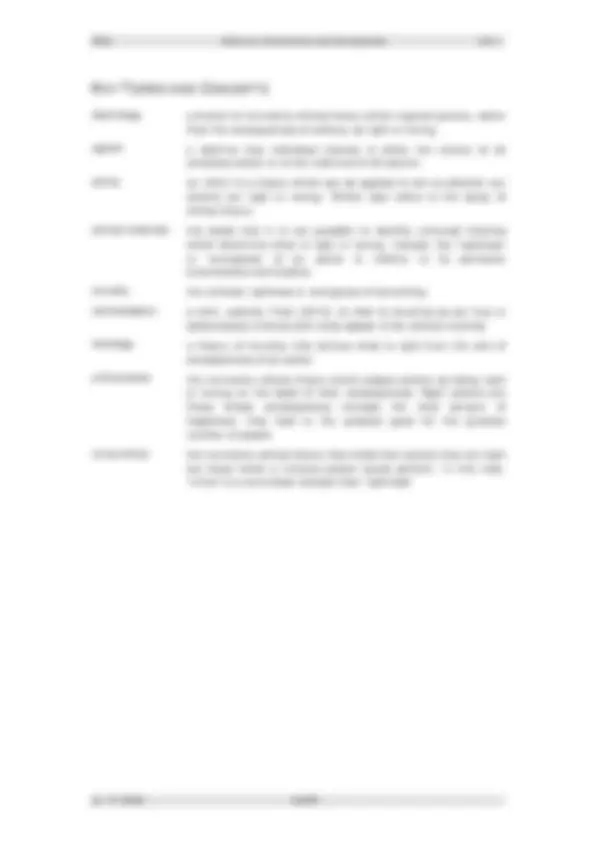


Study with the several resources on Docsity

Earn points by helping other students or get them with a premium plan


Prepare for your exams
Study with the several resources on Docsity

Earn points to download
Earn points by helping other students or get them with a premium plan
Community
Ask the community for help and clear up your study doubts
Discover the best universities in your country according to Docsity users
Free resources
Download our free guides on studying techniques, anxiety management strategies, and thesis advice from Docsity tutors
Ethics, also called moral philosophy, the discipline concerned with what is morally good and bad and morally right and wrong. The term is also applied to any system or theory of moral values or principles.
Typology: Lecture notes
1 / 41

This page cannot be seen from the preview
Don't miss anything!


































Traer R (2013) Moral philosophy: an adventure in reasoning. In: Doing Environmental Ethics , 2nd edn. Westview Press, Boulder, Colorado, pp. 3–20.
This chapter introduces the field of moral philosophy, from which much scholarly knowledge and understanding of ethics derives. It explains that ethics answers the question, ‘How should we live?’ The chapter considers some fundamental themes, including ideas about what is ‘right’ and ‘good’, and it examines ways of reasoning critically about our feelings. The field of environmental ethics is introduced, but the account presented in this chapter is also relevant to the theme of development ethics. A variety of key terms are introduced and defined in this chapter.
Wolf S (1982) Moral saints. Journal of Philosophy 79 (8) 419–439.
In this thought-provoking article, Susan Wolf argues that moral perfection, in the sense of moral ‘saintliness’, is not a particularly rational, good or desirable model of personal well-being toward which people should strive. In doing so, she presents a range of interesting and provocative ideas about normative ethics. In particular, she argues that, at some point, ‘we must be willing to raise normative questions from a perspective that is unattached to a commitment to any particular well-ordered system of values.’
Traer R (2013) Ethics and science: moral consideration. In: Doing Environmental Ethics , 2nd edn. Westview Press, Boulder, Colorado, pp. 21–39.
This chapter considers the relation between ethics and science, focusing on the evolution of scientific knowledge. The problematic area of valuing nature is introduced. The chapter shows that, far from being detached from questions of values and ethics, science plays a key role in those questions, because what we value depends on what we believe and that, in turn, is heavily influenced by science.
Crocker D (1996) International Development Ethics.
Available from: http://www.bu.edu/wcp/Papers/OApp/OAppCroc.htm
Gasper D (2009) Development Ethics and Human Development. HD Insights, HDR Networks Issue 24, United Nations Development Programme (UNDP).
Available from: http://hdr.undp.org/en/media/HD_Insights_January2009.pdf
Carnegie Council (2009) Joel Rosenthal: Pluralism & Ethics. Video. Duration 4. minutes.
Available from: http://www.youtube.com/watch?v=E6oc9JFUxEU
This video clip, featuring the President of the Carnegie Council, Joel Rosenthal, focuses on ethical pluralism. It addresses the question, ‘Where do we draw the line when deciding whose ethics are legitimate?’
LSULife (2007) What is Ethics? Video. Duration 1.36 minutes.
Available from: http://www.youtube.com/watch?v=ZIaHxC7BT0A
This short video clip shows a selection of university students attempting to define the term ‘ethics’.
TED (2009) Gordon Brown on Global Ethic vs. National Interest. Video. Duration 17.03 minutes.
Available from: http://www.ted.com/talks/lang/en/gordon_brown_on_global_ethic_vs_national_inter est.html
This video clip shows the former UK Prime Minister, Gordon Brown, answering questions about the ‘global ethic’ he called for. The video addresses the question of whether the interests of an individual nation can be reconciled with the greater good of humanity.
The study of ethics belongs primarily within the discipline of philosophy, in the sub- discipline of ‘moral philosophy’, and so our account begins there. Philosophical study concerns the systematic and rational consideration of human systems of belief. The process of asking and answering questions about belief systems is therefore fundamental to philosophical study – it is not sufficient merely to ‘learn’ the answers that have been proposed by other philosophers! The branch of philosophy called ‘ethics’ is concerned with questions concerning how human beings ought to live their lives, and about what is ‘right’ or ‘wrong’. In this section we look at how philosophers attempt to answer such questions in a systematic and rational way. This section also introduces the fields of environmental and development ethics, and consider how these two fields of study are interrelated.
By the end of this section, students should be able to:
What do you think philosophers do? How do they spend their time? Spend a few minutes thinking about what you know about philosophers past and present; if possible, try to identify some of the advances in knowledge that they have made. Try to write a brief definition of philosophy. What is the purpose of ‘doing’ philosophy?
As human beings live their lives, they acquire a wealth of information about the world around them that they use to build up a collection of ideas about the world and their place within it. Those ideas come from a variety of sources. They may come from scientific discoveries, personal experience, traditional beliefs commonly held by people in the society in which they live, and so on. Much of the time people accept those ideas without questioning them; they are relatively ‘unconsidered’ or ‘unexamined’. A philosopher, however, will attempt to scrutinise such ideas about the world to see if they are based on sound evidence. Instead of having a collection of unorganised beliefs and opinions that may be incoherent and self-contradictory, the philosopher believes that a person’s views should be carefully considered and organised into a coherent, meaningful, rationally defensible system.
You can see from reading the extract in 1.1.2 that philosophers have asked a wide range of questions and have come from many different backgrounds.
1.1.2 Who are the philosophers?
‘The occupations of philosophers have been as varied as their aims. Some have been teachers, often university professors giving courses in philosophy, as in the instance of Thomas Aquinas in the Middle Ages, teaching at the University of Paris, or John Dewey in the 20th century, lecturing at Columbia University, or Martin Heidegger at the University of Freiburg, or Ludwig Wittgenstein at Cambridge University. Others have been leaders of religious movements, often taking an active part in the affairs of their organisations, like St Augustine, who was Bishop of Hippo at the decline of the Roman Empire, or George Berkeley, who was the Bishop of Cloyne in Ireland in the 18th century. Many philosophers have had ordinary occupations, like Baruch Spinoza, who was a lens-grinder by profession. John Locke was a medical doctor; John Stuart Mill was a writer for magazines, and briefly a Member of Parliament. A good many of the most prominent philosophers have been scientists or mathematicians. Some have had careers which kept them far removed from the excitement and crises of everyday life; others were continually occupied in the most active pursuits.’
Source: Popkin and Stroll (1969) pp. xiv—xv
What all these philosophers have in common is that they have attempted to answer their chosen questions by working carefully and systematically through their ideas, convictions, and possible prejudices to arrive at an answer that they believe to be fair and rational. As Wraight (2011 p. 47) explains, philosophers ‘like to take problems back to their first principles, to look at the core concepts we employ and to see if they stand up to scrutiny’. While it might seem obvious to many people that, if there is suffering and inequality in the world, we should try to do something to help other people, for instance, philosophers try to find reasoned and rational explanations for why it is our duty to help people who are less fortunate than ourselves.
So, through the study of ethics, you are invited to examine critically your own and others’ arguments and intuitions about some important issues, however clear-cut those arguments may seem to be at first glance. As Wraight (2011 p. 48) points out, ‘many things that once seemed obvious (like witches having the power to curdle milk and the sun revolving around the earth) no longer do so to most people, in part, because rational individuals took the time to scrutinize them and found them wanting’. The study of ethics is, therefore, just as much concerned with developing the ability to ask and answer questions as it is with ‘learning’ the answers that other people have suggested to some of the questions posed here. Hopefully, by building up a clearer picture of the building blocks of people’s beliefs, values and arguments, ‘we can be more confident about our actual moral behaviour in the real world. We might even change our minds about a few things’ (Wraight 2011 p. 48).
Remember too that a philosopher is simply someone who looks at the world and tries to find coherent, rational answers to the questions people ask about that world. So you can be a philosopher, too!
Are you the type of person who usually ‘does the right thing’? How do you know what the ‘right thing’ is? What do we mean by the term ‘ethics’? Before you read on, take a few moments to write down a definition of what you think the term means. Now watch the video from La Sierra University ((LSULife 2007), available from the Multimedia listing) and compare your answer with the answers given by the students.
The branch of philosophical study that focuses on ‘ethics’ is concerned with studying and/or building up a coherent set of ‘rules’ or principles by which people ought to live. The theoretical study of ethics is not normally something that many people would regard as being necessary in order for them to conduct their everyday activities. In place of systematically examined ethical frameworks, most people instead carry around a useful set of day-to-day ‘rules of thumb’ that influence and govern their behaviour; commonly, these include rules such as ‘it is wrong to steal’, ‘it is right to help people in need’, and so on.
But sometimes the vicissitudes and complexities of life mean that these simple rules are sometimes put to the test. Consider the idea that it is wrong to kill. Does this mean that capital punishment is wrong? Is it wrong to kill animals? Is killing in self- defence wrong? Is the termination of pregnancy wrong? Is euthanasia wrong? If we try to apply our everyday notions of right and wrong to these questions, straightforward answers are not always forthcoming. We need to examine these questions in more detail; and we need theoretical frameworks that can help us to analyse complex problems and to find rational, coherent solutions to those problems. Whilst some people attempt to do this work individually, for themselves, philosophers attempt to find general answers that can be used by everyone in society.
Think about a significant decision that you have made that had an effect (either for good or bad) on the lives of other people. This could be a decision about changing a job, moving home, responding to a dilemma, helping somebody who was in difficulty, etc. How did you arrive at your decision? Was your decision based explicitly on ideas of what was right and wrong? Try to examine and record precisely the justifications for your decision. Can you identify any underlying principles or rules which you used to reach your decision? Examples of such underlying principles or rules might include: ‘I should do the best thing for my career in the long run.’ ‘It is OK to tell someone a lie if it prevents someone from being hurt by the truth.’ ‘I should always help someone in difficulty.’
The area of meta-ethics is more of a ‘pure’, abstract or theoretical, field of study, whereas the areas of normative and applied ethics tend to focus more sharply on how ethical considerations relate to human actions in general (in the case of normative ethics) or in particular situations and contexts (in the case of applied ethics). Given that our interest is principally on the study of ethics in relation to environmental and development issues, it is the latter which will provide the most useful insights. Therefore, our focus will be primarily on questions that fall within the areas of normative and applied ethics.
The study of ethics involves reasoning about our feelings. In other words, it involves making sense of and rationalising our intuitions about what is ‘right’ or ‘good’. Almost all people, to a greater or lesser extent, are capable of experiencing feelings of empathy towards others. Empathy provides us with a sense of what others are feeling and may thereby allow us to identify with other people. Empathy therefore gives us what Traer (2013) refers to as our moral sentiments ; and ethical reasoning about these sentiments gives us our moral principles. The integration of these moral sentiments and principles, Traer (2013) argues, is our conscience. Our moral conscience, then, is based on emotions, but should also be supported by reason.
All societies are characterised by their own ethical ideas – expressed in terms of attitudes and beliefs – and their own customs (their notions of what is considered customary). Some of those ethics are formalised in the laws and regulations of a society, nation or state. Such customs and laws can influence the consciences and the moral sentiments of those living in a society, as individuals acquire ideas and attitudes from their families and from their wider society. Philosophical ethics, however, asks us to take a step back from these influences and instead to reflect critically on our sentiments and attitudes.
Studying ethics, then, involves attempting to find valid reasons for the moral arguments that we make. Most people already have general ideas – or what philosophers call ‘intuitions’ or ‘presumptions’ – about what they think is ‘right’ or ‘wrong’. But a philosophical approach to ethics requires people to think critically about the moral ideas that they hold, to support or refute those ideas with convincing arguments, and to be able to articulate and explain the reasons and assumptions on which those arguments are based. As Traer (2013) explains, in moral philosophy, an argument is not simply about our beliefs or opinions; instead, it is about the reasons underlying those beliefs or opinions. This means that the real value of discussing and debating ethical questions is not to ‘win the argument’ or to ‘score points’ against the other person! It is more important to provide carefully considered arguments to support our ideas, and to allow for rational – and deeper – understanding of the reasons underlying our beliefs, ideas and attitudes. Crucially, this requires careful listening to, analysis of and learning from the arguments that others make.
One common fault with many arguments about what is ‘right’ or ‘wrong’ – and one that Traer (2013) highlights – involves what is known as a rationalisation. A rationalisation occurs when we use what at first glance seem to be rational or credible motives to cover up our true (and perhaps unconscious) motives. For example, if a landowner seeks to build a plastic recycling plant and states that this is driven by a desire to create local employment opportunities – whereas in fact their true motive is to make a profit – then this is a rationalisation. The landowner is not giving their true reasons for wanting to build the plant. If, however, they argue that they want to make a personal profit and create local jobs, then they may be giving two true reasons for their motives.
Traer (2013) explains that we can uncover these types of errors in our own and others’ arguments by using what he calls ‘critical reasoning’. Three forms of critical reasoning that individuals can use to justify their arguments are outlined in 1.3.1.
1.3.1 Three forms of critical reasoning
‘ Reasoning by analogy explains one thing by comparing it to something else that is similar, although also different. In a good analogy, the similarity outweighs the dissimilarity and is clarifying. For instance, animals are like and unlike humans, as humans are also animals. Is the similarity sufficiently strong to support the argument that we should ascribe rights to nonhuman animals as we do to humans?’ ‘ Deductive reasoning applies a principle to a situation. For instance, if every person has human rights, and you are a person, then you have human rights like every person.’ ‘ Inductive reasoning involves providing evidence to support a hypothesis. The greater the evidence for a hypothesis, the more we may rely on it.’ The fact that there is mounting evidence that the burning of fossil fuels is having a detrimental effect on global climate, for example, is used to substantiate the argument that we have a moral duty to reduce carbon emissions.
Source: Traer (2009) p. 8. (emphasis added)
There is another important argument that people use when making ethical arguments: religious faith. For many people, ’morality and religious faith go hand in hand’ (Traer 2009 p. 8). Rather than relying on rational arguments, some people view actions as being right or wrong in terms of whether they are commanded by a god. Some moral philosophers do not view arguments based on religious faith as being rationally defensible. They believe that we can determine through rational reflection what is right and wrong. If a god commands only what is right then, logically, this makes divine commands unnecessary; we are able to know what is right or wrong without relying on any divine commandments, as we can use rational reflection.
(2) Consistency. Arguments need to be consistent. One can only argue that it is morally wrong to kill one person and yet morally acceptable to kill another, if one can demonstrate that there is a morally relevant difference between the two individuals. Wraight (2011) gives the example of the moral argument that debts owed by poorer nations to international lenders should be cancelled. Does this therefore mean that all poor people who owe money to banks should also have their debts cancelled? If you don’t think that all individual debts should be cancelled but you do think that poorer countries’ debts should be cancelled, then you have to show that there is a moral difference between the two. Otherwise your arguments are inconsistent. (3) Good will. Wraight (2011) admits that this is the most difficult criterion to quantify. While arguments may be factually correct and consistent, they also need to ‘exemplify good will’ (Wraight 2011 p. 52). This involves resorting to our intuitions and emotions, which are notoriously difficult to integrate with rigorous theoretical debate.
Source: drawn from Wraight (2011)
We have considered what ‘philosophy’ is, what ‘ethics’ means, and what it means to look at arguments critically and provide careful reasoning to support our arguments. The types of issues and questions that ethicists look at are, of course, very broad- ranging, and so philosophers tend to specialise in one area of ethics. When philosophers consider how general ethical arguments can be applied to one particular area of peoples’ private or public lives that involve moral judgements (such as the areas of development ethics and environmental ethics), we call this applied ethics. Many often quite distinct areas of applied ethics have therefore developed, each with their own academic journals, conferences and influential authors.
Two such areas of applied ethics are of direct concern to us. The first, development ethics , emerged as a field of study in the second half of the 20th century. It questions and looks at the ethical implications of ideas such as ‘progress’ and at the implications of various types of social change. It considers the costs and gains from major socioeconomic changes, and whether those in wealthier countries have a duty to help those in poorer parts of the world. As with most areas of applied ethics, it has a purpose: to ‘help in identifying, considering and making ethical choices about societal “development”, and in identifying and assessing the explicit and implicit ethical theories’ (Gasper 2004 p. xi). In other words, it aims to give clearer understanding of the key issues surrounding socioeconomic development, and to unpick the many hidden assumptions about what is the ‘right’ or ‘good’ thing to do. Key issues include social and human rights, poverty reduction, the gap between rich and poor, and planned international intervention by some nations in the development of others.
A second area of applied ethics is environmental ethics. Environmental ethics emerged as a separate area of philosophical study during the 1970s. The approaches of environmental philosophers are varied, but most take as their starting point the belief that we are facing a critical point in our relationship with the non-human world, and that in order to avert (or reverse) an ecological crisis, we need to reassess the ways in which we value the non-human world. While not all environmental philosophers suggest that we need a new approach to the ethical values we assign to nature, many varied suggestions have been made as to which alternative frameworks we should use for valuing nature.
These two important areas of applied ethics are central to understanding many important contemporary issues, such as those related to sustainable development, climate change, and environmental management. Issues are also raised by environmental and development ethicists in relation to another important area of applied ethics: corporate ethics (although some would regard business/corporate ethics as a further area of applied ethics in its own right).
1.4.1 provides some examples of the issues that concern both development and environmental ethics.
1.4.1 State of the World 2012
In 1992, governments at the Rio Earth Summit made a historic commitment to sustainable development — development that promotes the maintenance and wellbeing of both people and ecosystems. More than twenty years and several summits later, humanity has never been closer to ecological collapse; one third of humanity lives in poverty; and another 2 billion people are projected to join the human race over the next 40 years. How will we move toward sustainable prosperity equitably shared among all even as our population grows, our cities strain to accommodate more and more people, and our ecological systems decline? In short, ‘sustainable prosperity’ would come as a result of ecological regenerative development that enables all human beings to live with their basic needs met, with their dignity acknowledged, and with abundant opportunity to pursue lives of satisfaction and happiness, all without risk of denying others in the present and the future the ability to do the same. This means not just preventing further degradation of Earth’s systems, but actively restoring those systems to full health.
Source: Worldwatch Institute (2012)
Read again 1.4.1 entitled State of the World 2012. What issues are raised in the text that relate to development ethics? What issues relate to environmental ethics? Are there any issues which you think would concern both development ethicists and environmental ethicists? Answer Whilst at first glance there are some issues which clearly seem to fall within the realm of development ethics (such as the fact that one third of humanity lives in poverty) and others within the realm of environmental ethics (such as the decline of ecological systems), in reality these issues are often closely interrelated and involve consideration of both development and environmental ethics.
1990s, campaigns were often led by specialist NGOs that tended to focus on either environmental or development issues, grassroots citizen groups are increasingly speaking for themselves in campaigns and the distinctions between ‘environmental’ or ‘social justice’ campaigns are becoming blurred (Smith and Pangsapa 2008).
As the arguments in 1.4.3 make clear, in order to understand more fully the ethical debates and issues underlying key contemporary issues, it is important to consider arguments and issues relating to both the environment and development. One term that is sometimes used to refer to this combination of concerns is environmental citizenship.
1.4.3 Environmental and social justice
‘Right from the start we want to emphasize the importance of recognizing that environmental issues cannot be separated from questions of social justice — that there is no contradiction between addressing environmental issues and social inequalities. These are necessarily complementary issues, not contradictory ones. Even the preservation of wilderness areas and the conservation of transformed and managed landscapes have social implications both in terms of the access to environmental goods of people traditionally excluded from these benefits and the social justice concerns that directly pertain to rural folk and traditional livelihoods that can often be relegated to insignificance by environmental campaigns that some NGOs have initiated without consultation or forethought.’
Source: Smith and Pangsapa (2008) p. 1
uestion 1
State what is meant by the term ‘meta-ethics’.
uestion 2
State what is meant by the term ‘normative ethics’.
uestion 3
State what is meant by the term ‘applied ethics’.